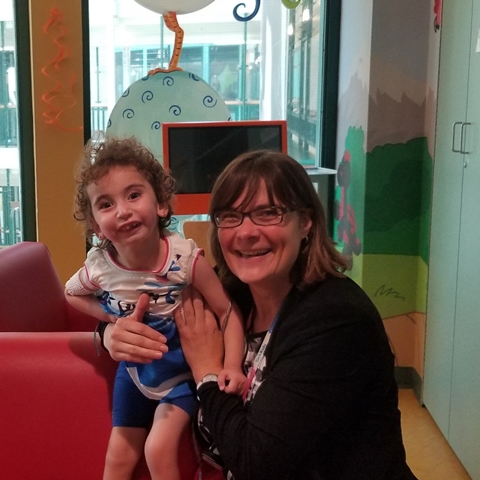By Jane Kitchen and Maia Leggott
The Social Work program at The Hospital for Sick Children (SickKids) in Toronto offers support to families at their most vulnerable – when their child has a complex or serious medical issue.
SickKids has a team of 60 medical social workers, all MSWs, who empower families in their ability to manage the impact of diagnosis and support them throughout the child’s care journey.
“Our medical social workers are a huge part of the highly specialized medical teams at SickKids,” says Dr. Jonathan Golden, Director of Collaborative Professional Practice (Psychology and Social Work). “They bring their specialized training to both medical and mental health care plans offered at SickKids.”
Social workers take a holistic approach to their work with families, who experience many stressful transitions when caring for their sick child, such as changing health status, starting or returning to school and transitioning into adult services. They are at the front line to provide mental health services to patients, siblings, and parents as they journey through their experience of acute and chronic illness.
“We can’t emphasize enough how important mental health support is for these families,” says Christina Bartha, Executive Director, Brain and Mental Health Program. “We recognize that our families and patients are facing very challenging circumstances that can be short-term, long-term or both. Our social workers provide essential therapeutic support and education and are particularly sensitive to the diversity of need across the many populations that we serve.”
The social work team is connected to various programs across the hospital, such as adolescent medicine and psychiatry, working with physicians, nurses, and allied health team members in an interdisciplinary care approach. They work with both inpatient and ambulatory populations, including acute care (such as in the NICU or emergency department), and chronic care (for kids with ongoing medical issues).
“The biggest transition a family experiences is into the experience of illness,” says David Brownstone, Professional Practice Lead, Social Work. “It is unexpected and it is like arriving in a new country where you don’t know the way. Social workers help develop the map for them to best navigate this journey.”
This was the case for Gitty Samsonowitz, who first met a social worker at SickKids when her daughter Adina was in the NICU. She had never had an experience with a social worker, yet quickly realized how valuable her support was in helping her make sense of their new reality.
Adina, now 4, is a medically complex patient and has been admitted to hospital 48 times in four years, with many stays being over a week in length. Once Adina was transferred to Paediatric Medicine at SickKids, her family met Kathy Netten, a social worker in the Complex Care Program. Whether in clinic, on the wards, or in the community, Netten connects with family members to provide psychotherapy that addresses the losses and trauma they face.
Netten says it is an incredibly stressful time for families when they are at the hospital; not only do they have everything they are dealing with in their lives generally but now they have the additional layers of an ill child and the concerns that this brings with it, such as juggling childcare, work, and finances. Social workers can help families logistically with these concerns and also to manage the accompanying stress.
Additionally, watching your child suffer takes a toll. ”Seeing your child in pain is really hard, especially when as a parent you try to comfort your child,” says Netten. “They see them going through these very difficult experiences day after day and when they feel their child is suffering that creates great emotional stress.”
The uncertainty is also hard. “With a child such as Adina with special needs, they’re so sick, but then they’re stable, and you have to worry about the developmental piece, and I grieve that loss all over again when she’s stable,” says Samsonowitz. “I had a really hard time accepting that she would have a limited life, we don’t know where she’s headed. Accepting that was very difficult for me.”
Her social worker has helped her immeasurably, Samsonowitz says: “Kathy helped me see Adina who she is aside from the diagnosis. She doesn’t just help me through the hard times, she’s always there celebrating as well. She has saved us so many times.”
Positive feedback on the team is standard: “I am delighted that family feedback consistently speaks to the vital role our social workers play in their children’s care at SickKids,” says Bartha.
Jane Kitchen is a Communications Specialist and Maia Leggott is a Communications and Public Affairs Intern at SickKids.


